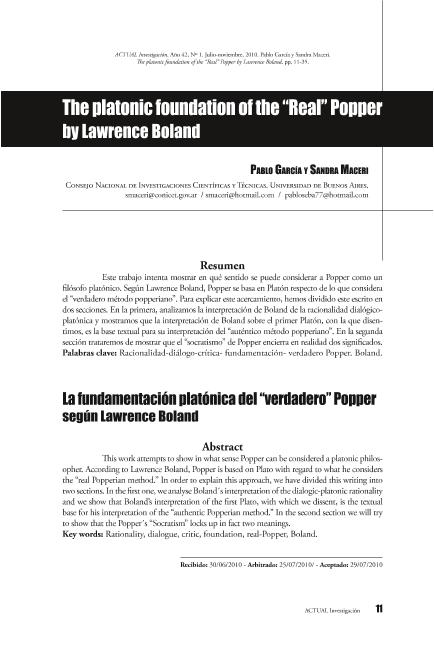Artículo
Este trabajo intenta mostrar en qué sentido se puede considerar a Popper como un filósofo platónico. Según Lawrence Boland, Popper se basa en Platón respecto de lo que considera el “verdadero método popperiano”. Para explicar este acercamiento, hemos dividido este escrito en dos secciones. En la primera, analizamos la interpretación de Boland de la racionalidad dialógicoplatónica y mostramos que la interpretación de Boland sobre el primer Platón, con la que disentimos, es la base textual para su interpretación del “auténtico método popperiano”. En la segunda sección trataremos de mostrar que el “socratismo” de Popper encierra en realidad dos significados. This work attempts to show in what sense Popper can be considered a platonic philosopher. According to Lawrence Boland, Popper is based on Plato with regard to what he considers the “real Popperian method.” In order to explain this approach, we have divided this writing into two sections. In the first one, we analyse Boland´s interpretation of the dialogic-platonic rationality and we show that Boland’s interpretation of the first Plato, with which we dissent, is the textual base for his interpretation of the “authentic Popperian method.” In the second section we will try to show that the Popper´s “Socratism” locks up in fact two meanings.
La fundamentación platónica del “verdadero” Popper según Lawrence Boland
Título:
The platonic foundation of the “Real” Popper by Lawrence Boland
Fecha de publicación:
07/2010
Editorial:
Universidad de los Andes
Revista:
Actual investigación
ISSN:
1315-8589
Idioma:
Inglés
Tipo de recurso:
Artículo publicado
Clasificación temática:
Resumen
Archivos asociados
Licencia
Identificadores
Colecciones
Articulos(IIEP)
Articulos de INST. INTER. DE ECONOMIA POLITICA DE BUENOS AIRES
Articulos de INST. INTER. DE ECONOMIA POLITICA DE BUENOS AIRES
Citación
Garcia, Pablo Sebastian; Maceri, Sandra Beatriz; La fundamentación platónica del “verdadero” Popper según Lawrence Boland; Universidad de los Andes; Actual investigación; 42; 69; 7-2010; 11-35
Compartir




